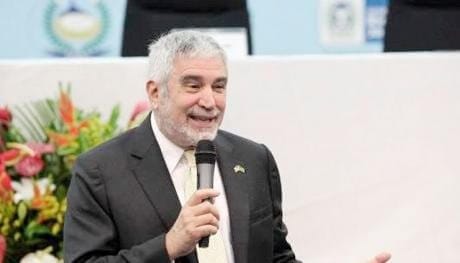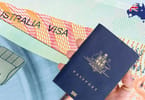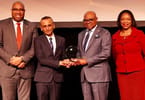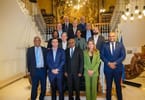In William Shakespeare’s play Romeo and Juliet the playwright places into the mouth of his leading character, Juliet, the declarative or rhetorical question: “What’s in a name? That which we call a rose by any other name would smell as sweet.” Shakespeare’s point is that the name matters less than the action described; what something is called is less important than what it does. Although Shakespeare might be correct when it comes to flowers or love,
It is far from certain if the same can be said of social policy where words matter more than what we might believe and have often caused both acts of greatness and tragedy – moments of joy and sadness. Words then have power and how we interpret them is important.
Like other theme issue authors, I aim to respond to the question: Has tourism the resources and answers to a more inclusive society? In reality, it is not a single question but rather a potpourri of economic, philosophical, political and sociological questions flavoured with historical tidbits and expressed in a short sentence. The question is also carefully worded: It does not ask if tourism has the resources and answers to an inclusive society, but rather to (for) a more inclusive society? In other words it is a question not of absolutes but of degrees. Were we speaking about gastronomy rather than tourism we might compare this question to a typical Caribbean stew, something that contains a bit of everything and whose flavor is dominated by nothing.
The question posed assumes that the responder understands the concept of tourism, and in a like manner that he/she has some knowledge of the business. In a like manner, the question also raises issues about tourism and ecology and how inclusiveness interacts with expanding populations that must share potentially limited resources. What makes the question difficult to resolve is that tourism is not a homogenous activity. It is a composite industry with numerous sectors such as hotels, restaurants, and transportation.
To subdivide these sectors still further. From this perspective tourism is like the Milky Way; it is an optical illusion that appears to be a whole but in reality is an amalgamation of many sub-systems, each with additional systems within the sub-system and taken together, this is tourism.
Our tourism system also resembles other social and biological systems – just as in a biological system the health of the whole is often dependent on the health of each subcomponent.
In tourism, when anyone sub-component ceases to function, the entire system is liable to break down. Further, as is the case with dynamic life forms, tourism activities share commonalities but they are unique to each location. For example, tourism in the South
Pacific shares certain similarities with its sibling industries around the world, but it is also radically different from a European or North American tourism setting.
In what follows, I will first address the meaning of an inclusive society and then attempt to determine if tourism has the economic, managerial, political and social will to help create more inclusive societies.
The philosophical issue of inclusivity
Given the theme issue question wording, it is clear that the questioner sees inclusivity as a positive social attribute and has placed emphasis on the issue of tourism having the necessary resources (monetary and informational) to expand inclusivity to the greatest number of people possible. Thus the question is front-loaded, that is, we know the desired
result but need to find a way to obtain such a result. The reader should appreciate the reasons for the questioner’s assumption: It is human nature not to want to be excluded.
Kristian Weir writing in the journal of the American Psychological Association uses the word “rejection” in the sense of “exclusion” and states:
As researchers have dug deeper into the roots of rejection, they’ve found surprising evidence tha the pain of being excluded is not so different from the pain of physical injury.
Rejection also has
serious implications for an individual’s psychological state and for society
in general
The dictionary definition also supports a positive value of inclusivity. The
Merriam- Webster Dictionary of the American language provides one of the
definitions of the term inclusive (inclusivity) as follows: “including everyone especially: allowing and accommodating people who have historically beenexcluded (as because of their race, gender, sexuality, or ability
At face value, the desire to increase inclusion is an ambitious goal, though
few would argue that a person should be excluded from purchasing an airline ticket, registering at a hotel, or eating at a restaurant due to his or her gender, race, religion, nationality, sexual orientation or other biological
traits. National laws have already addressed and made illegal most, if not all, forms of discrimination based on such inherent characteristics as a person’s creed, nationality, race or religion. The question of discrimination is in most parts of the world settled law. In view of this, should inclusivity focus on social acceptance or social integration?
This prompts two spin-off questions:
Q1. Is the goal of inclusivity doable or merely an aspiration?
Q2. Can the notion of inclusivity be a way by which dominant groups control less powerful groups of people?
Regarding the first of these two questions, the issue of do-ability is
central. As Immanuel Wallerstein of Yale University notes:
Inequality is a fundamental reality of the modern world-system as it has
been of every known historical system. The great political question of the
modern world, the great cultural question, has been how to reconcile the
theoretical embrace of equality with the continuing and increasingly acute
polarization of real-life opportunities and satisfactions that have been its outcome.
The questions Wallerstein proposes lie at the very heart of the question of
inclusivity in tourism.
The second question is harder to answer and forces us to consider the
possibility that a group might reject inclusivity or believe that inclusivity
has been foisted upon them. Is there such a thing as forced-inclusivity? If
discrimination is illegal then why should tourism have to deal with issues of
social inclusivity? In part, the answer depends on how we view inclusiveness and on how we view tourism. Is tourism a single industry that speaks with one voice or does the industry have multiple voices? Is tourism a philosophy or a business and if it is a business then are we speaking only about a profit motive or are we also speaking about corporate social responsibility?
If tourism is to go beyond the letter of the law with regards to all customers and employees being treated with dignity then we are speaking about
an ambitious and perhaps unattainable goal. Tourism is, for the most part,
already a non-discriminatory industry, and good customer service demands that its personnel treat all people as honored customers.
As any traveler knows, tourism relies on people and they do not always live up to the standards set. Despite the fact that failures do occur there is
little doubt that employees are trained to provide good and non-discriminatory\ service. Although it does not always occur, the first-century Mishnaic text Pirke Avot states, “You are not required to complete the work, but neither are you at liberty to abstain from it In other words, we must have the goal even if the ultimate goal might never be obtained.
Despite these aspirational goals, as a member of a minority group the term
“inclusive” also bothers me. Does the term assume that the minority are
expected to behave in accordance with the standards of the majority despite the fact that it might not want to be included? Does the word “inclusiveness” also reflect a measure of condescension? Is the word telling the weak that they should be appreciative of their inclusion? Does the term inclusivity resemble another term that the strong like to use regarding the weak: tolerance?
Do both works reflect a majority culture’s sense of noblesse oblige, a way
for the majority culture to feel good about itself while at the same time
dominating the weaker culture?
Furthermore, periods of what we might call: “inclusive-tolerance” have not
always ended well, especially for those being “included” or “tolerated”.
History is littered with examples of so-called “tolerant” periods, often having
occurred during times of economic expansion, when majorities prided themselves on their levels of inclusivity and tolerance. Unfortunately, the idealism of tolerance and degenerate into bigotry and inclusivity can turn into exclusion.
From this perspective, we might question if the word “inclusion” is not another way of attaining dominance? For example, the French Revolution was a revolution of inclusion, as long as your group and your ideas were acceptable to the revolution. The revolution ended not only with a reign of terror but also with the French state incorporating conquered peoples into French culture, whether they wanted to be included or not. Perhaps the revolution’s pièce de resistance was the so-called Paris Sanhedrin established by Napoleon in 1807. At this conclave, Napoleon gave rabbis the choice of “forced” inclusion into French society or life within the dirt and stench of the Paris ghettos. If we go forward in history some 100 years, we see the final playing out of the French revolution in Marxist Russia. Once again, inclusion meant either being absorbed into the “inclusive proletariat” or being declared an enemy of the revolution and the consequence of the latter choice was death.
These historic patterns have continued into the present. We might have
expected that a post-Nazi Europe would have sought to eliminate its societal
demons of conspiracy, anti-
Semitism and racism. Yet less than a century after the defeat of Nazi
Germany, Europe still struggles. French Jews consistently report that they have little faith that the French police will protect them. They often live in fear and many have emigrated from France after finally giving up on Europe. The situation in the United Kingdom is arguably no better. Despite the decline of“Corbynism” recent polls in Britain, taken during the Covid-19 crisis demonstrate that one in five British citizens believes the outbreak of the Covid-19 pandemic is a Jewish or a Muslim plot. What is fascinating about this poll is that it reflects many of the same opinions that Europeans expressed in the 14th century during the Black Plague. When pollsters asked what they base this prejudice on the most common answer is “I do not know.” The attitudes expressed in these two modern and “tolerant” European nations might support the hypothesis that when economies contract prejudice tends to increase. If so, the post-Pandemic economic period might reflect a rise in racial and religious bigotry. Given the historical record of inclusion we need to question if what Europeans (and many North Americans) mean by “inclusion” is really “assimilation” or loss of cultural identity. Is the term merely a polite way of saying: surrender your culture? If that is the true meaning of the word then the
answer of many who are to be included might well be no thank you.
To be fair not all is negative. For example, both Portugal and Spain have
worked hard at correcting the historic injustices that occurred during the
Inquisitions. Both nations have used their tourism industry to explain the
tragedies of the past and to attempt to create a state of historic healing. The
same can also be said of post-Nazi Germany. Despite these bright spots as a
norm, European and North American majority cultures have expressed tolerance
for the other, but rarely ask the “other” if they want to be tolerated. Much to
the surprise of those who promote inclusion, not everyone wants to be included – often it is the contrary. From the perspective of the “included” or “tolerated this caring attitude does not always produce the anticipated results: at times minorities view this well-meaning sociopolitical position as merely condescending. It is the same condescending feeling that many nations around the world have felt when they are given the opportunity of being westernized.
Just as is the case with the term “multi-culturalism” there are minority groups that have come to view the term as meaning: “I am giving you the opportunity of being just like me!” That is, the majority culture gives the minority culture the opportunity to accommodate itself to the majority culture’s norms rather than being allowed the dignity of merely “being”.
From the perspective of tourism, this distinction is essential for at least
two reasons:
(1) Tourism thrives on the unique. If we are all alike then there is no real
reason to travel. How often do visitors complain that local culture has been
diluted to the point that it is merely a show put on by natives to satisfy the
cultural appetite of westerners? Visitors come and go but the native
populations are left to deal with the social and medical problems that visitors leave behind.
(2) Tourism, and especially overtourism not only saturate a market, but it
also often threatens the actual viability of native cultures. In this scenario,
success breeds the seeds of success’ own destruction. As the world becomes more inclusive, does it also become more similar?
Tourism and inclusivity
Tourism is in essence, a celebration of “the other”. As the United Nations
World Tourism Organization (UNWTO) has noted:
Every people and every place possess a unique culture. Experiencing
different ways of life, discovering new food and customs and visiting cultural sites have become leading motivations for people to travel. As a result, tourism and travel activities are today a crucial source of revenue and job creation.
This openness and acceptance of the other might be a reason that terrorists
have come not only to target the tourism industry but also to despise it.
Terrorism seeks to create a xenophobic world in which a person is deemed
expendable for being born into the wrong nationality, race, or religion and is perhaps the ultimate form of exclusion of the other.
To accomplish this goal terrorism must preach that those who are not like
“us” are not to be trusted.
Tourism as an inclusionary business in the age of pandemics
The tourism is a business activity and as such, it is not concerned about a
person’s race, religion, or national origin as it is focused on bottom line
results. To survive, a tourism business, like any other business, must earn
more money than it spends. In the context of the theme issue question if it
uses the word “inclusion” to mean: the acceptance of any customer who lives within the law and is willing to pay the price, then tourism has traditionally sought to be a model for the ideals of inclusion. Unfortunately there is often a difference between the “ought to be” and the “is”. Inclusion in business should be ubiquitous. Not all nations, however, recognize each other’s passports and within the tourism industry there arecases of both racial and political discrimination.
The Covid-19 crisis has challenged the idea of inclusionary travel. Soon
after the pandemic began, nations began to close borders and the idea that
everyone was welcome ceased to exist. In this context, many viewed
international agencies such as the United
Nations to be irrelevant. Instead, each nation did what it considered to be
best for its own citizens. Will seamless and inclusionary travel in the
post-Covid-19 world become a principle of the past? In a world with unstable political situations, shrinking economies and employment scarcity and therenewal of prejudices from the past will the tourism industry have to become more exclusionary as to whom it hires and serves?
Tourism resources
These economic, political and philosophical questions lead to the final part
of this viewpoint: Does tourism have the resources and answers. . . This
prompts a deeper question: “What is tourism?” The tourism industry is neither tangible nor standardized, nor is it monolithic.
There is no one tourism industry, but rather an amalgam of diverse
activities. Is the tourism industry nothing more than a concept created to
describe this mélange? Should we view tourism as a social construct, an
abstraction that acts as a shorthand for multiple industries that under the
best of circumstances work in conjunction with each other?
These questions lead to an over-arching question: Assuming that the tourism industry was able to come together as a single industry, would it have the resources to change or impact world policies? The answer has to be both yes and no. The tourism industry, currently fighting for its own survival, does not have the resources to pressure governments to adopt standard philosophical social policies. This weakness is pronounced during the 2020 historical period, as many global organizations seem to have been poorly prepared to deal with the
health and economic crises that have occurred. Some academics and technocrats argue that despite the failures, the global economy should revert to another period of internationalism and technocratic professionalism and of universal inclusion.
Others argue for a more popularist position, noting that too many
technocrats and academics are removed from real world problems. Many elections in both Europe and the
Multi-cultural industry
Americas point to populists’ frustrations with the current ruling elites.
They note that too many working class people have suffered from the mistakes made by the media, by intellectuals and academics, and by these ruling elites.
Were the recent riots that broke out across US cities only due to racial
frustrations or additionally the manifestation of pent up anger due to months of forced “shelter-in-place” policies? For many, there is a foreboding premonition that the world has returned to the pre-revolutionary atmosphere of the French
Revolution.
In these troubled times might tourism be an instrument of understanding, for pluralism and for peace? If tourism can promote these ideals then we may beable to go well beyond conventional notions of inclusivity and that togetherthe human race can accomplish great things. The British actor and essayist TonyRobinson stated:
Throughout human history, our greatest leaders and thinkers have used the
power of words to transform our emotions, to enlist us in their causes, and toshape the course of destiny. Words can not only create emotions, they create actions. Andf rom our actions flow the results of our lives.
The tourism industry understands the power of words and as such in these
turbulent times if it chooses its words carefully then the answer to our
question will be that tourism might not have the pecuniary resources to changethe world, nor all of the necessary knowledge, but if it can help each of us to
understand that we are all voyagers on a small planet set in the vastness of
space and subject to powers stronger than all of us together – then that is more than enough.
WHAT TO TAKE AWAY FROM THIS ARTICLE:
- Given the theme issue question wording, it is clear that the questioner sees inclusivity as a positive social attribute and has placed emphasis on the issue of tourism having the necessary resources (monetary and informational) to expand inclusivity to the greatest number of people possible.
- Our tourism system also resembles other social and biological systems – just as in a biological system the health of the whole is often dependent on the health of each subcomponent.
- It is an optical illusion that appears to be a whole but in reality is an amalgamation of many sub-systems, each with additional systems within the sub-system and taken together, this is tourism.






















